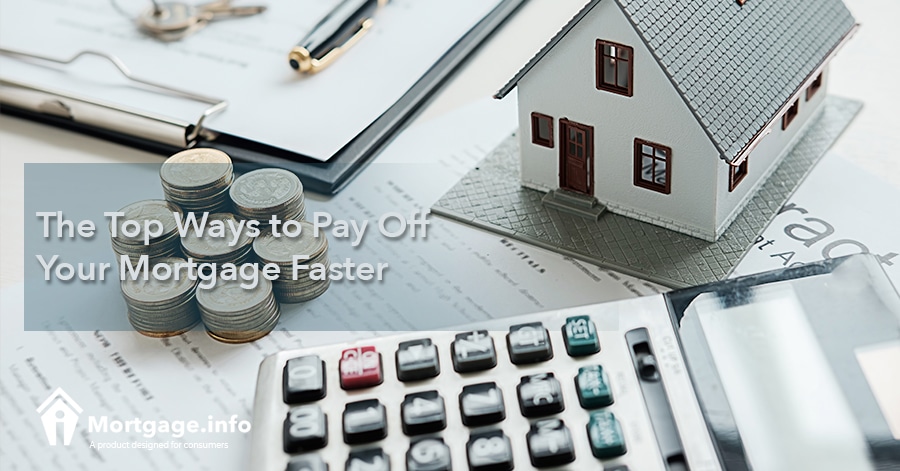
When you first took out your mortgage, you were probably excited at the thought of becoming a homeowner. As the years pass, though, you may have an increasing desire to pay that mortgage off faster than the term you chose.
Looking for Current Mortgage Interest Rates? Click Here.
Since you probably don’t have hundreds of thousands of dollars lying around to pay the loan off in full at once, you need ways to pay your mortgage off faster than the minimum payments allow. Keep reading to learn the top ways to make this happen for you.
Make an Extra Payment Each Year
One extra payment a year may not sound like a lot, but if you do this consistently for 15 years, you knock 15 payments off your loan – that’s more than one year of mortgage payments. Not only does knocking the interest down decrease the time it takes to pay off your mortgage, but it also decreases the amount of interest you pay on the loan.
Make an Extra Payment Every Quarter
If you can afford it, speed up the frequency that you make an extra payment to further decrease your principal and the amount of interest you owe. Choose dates that work well for you three times a year and make that extra payment.
With three extra payments each year, you could make a total of 45 extra payments over the course of 15 years. That is the equivalent of just under four years of mortgage payments and thousands of dollars’ worth of interest.
Pay an Extra 1/12th of the Mortgage Payment Each Month
If you can’t fathom making a full mortgage payment once a year, consider breaking it up into manageable pieces. Take your standard mortgage payment and divide it by 12 months. You then add this amount to your standard mortgage payment each month.
Here’s an example. If your mortgage payment (principal and interest) is $1,000, you would add $84 to your $1,000 mortgage payment each month. Paying $1,084 per month will help you make an additional $1,000 payment by the end of each year.
Apply Windfalls to Your Mortgage
If you regularly receive windfalls, consider applying all or part of the amount to your mortgage. The most common examples of windfalls include:
- Tax refunds
- Work bonuses
- Inheritance money
- Wage increase
Since you didn’t have the windfall money before, you shouldn’t count on it for your regular income. This should enable you to apply the money toward your mortgage’s principal balance, helping you to pay the mortgage down faster.
Make Biweekly Payments
Biweekly payments are another way to make extra payments each year without going over your budget. Technically, you divide your mortgage payment in half, paying each half every two weeks. Since there are 52 weeks in a year, you end up making an extra mortgage payment (13 payments) without really doing anything special.
Watch out with this method, though. Some mortgage companies offer a ‘service’ to help you make biweekly payments. The service, as you probably guessed, costs money. You don’t need the service, as you can figure out the 50/50 payment yourself. If your mortgage lender won’t allow you to do it on your own, simply set aside the payment every two weeks, making one regular mortgage payment every month and applying the ‘extra’ money you have towards the principal.
Click to See the Latest Mortgage Rates.
Round up Your Payments
Rounding up your payments is a simple way to add a little extra money to your mortgage without going over budget. You won’t knock years off your mortgage, but you will consistently get the principal balance lower.
How much you round up your payments depends on what you can afford. For example, if your mortgage payment is $1,190, you can round up to $1,195, 1,200, or even $1,300. You decide what you can afford and then be consistent in your efforts. This will help you get the principal balance lower and decrease the amount of interest you owe over the term of the loan.
Make 15-Year Payments
You can shorten the amortization period of your mortgage without refinancing it. This saves you money on the closing costs and gives you the benefit of a shorter-term mortgage. If you have a 30-year mortgage, simply take your outstanding principal balance and interest rate and run it through a mortgage calculator using a 15-year term.
Once you know the 15-year payment, you can make those payments, noting to apply the extra money you pay toward the principal. This way you get the best of both worlds – you make 15-year payments, but have the option to make smaller 30-year payments should finances become tight.
Paying your mortgage off faster not only makes you a homeowner without a mortgage faster; it decreases the amount a mortgage costs in the end. Saving money on interest can save you thousands of dollars, giving you opportunities to invest your money elsewhere.
